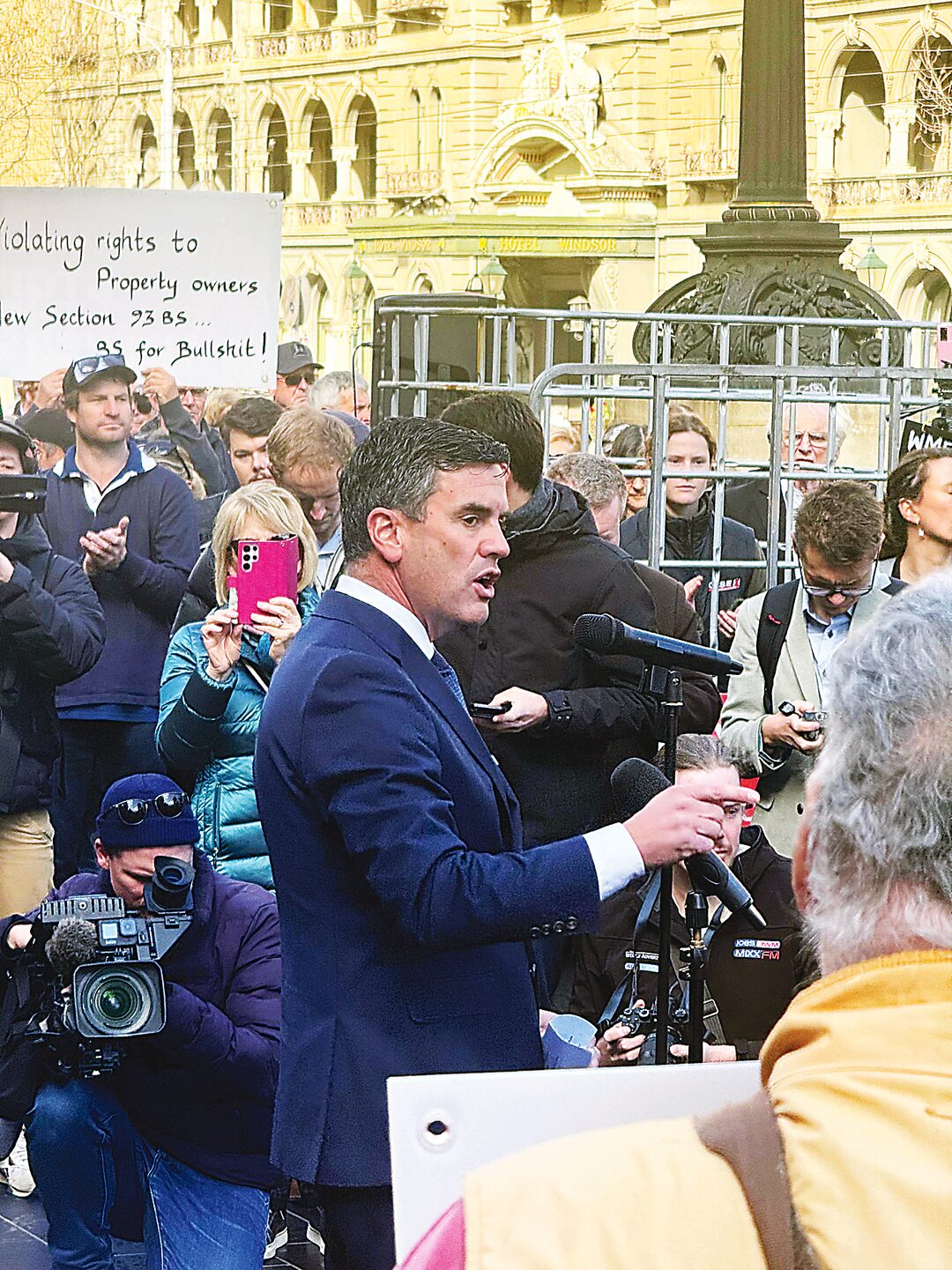By PHILIP HOPKINS
LEGISLATION has passed in State Parliament that threatens farmers with fines if they do not allow access for transmission projects, just as an official report shows those transmission links are blowing out in cost and could feed into higher energy prices.
The legislation passed through the House of Assembly on Thursday (July 31) and will now be debated in the Legislative Council.
The Nationals reiterated their opposition to the new legislation proposed by the state Labor government, which would allow government officials and transmission companies to enter private farmland without consent and fine landholders who object.
The Victorian Farmers Federation has also strongly opposed the legislation.
The Nationals’ Member for Morwell, Martin Cameron, said the National Electricity (Victoria) Amendment (VicGrid Stage 2 Reform) Bill would hand sweeping powers to VicGrid and authorised officers, allowing them to forcibly access private property, cut locks, break gates, and issue penalties for resistance.
Under the Bill, landholders who obstruct access to authorised officers could face fines up to $12,210. Refusing to provide identification or proof of ownership may attract penalties over $4000. Interfering with notices of entry could incur fines of more than $1200. Corporations face even higher fines, reaching nearly $49,000.
“This is an outrageous overreach from a government that has lost control of its energy rollout, and once again it’s hardworking farmers and regional families who will bear the brunt of these reckless decisions,” the Member for Morwell said.
“Under this bill, authorised officers can cut locks, break gates, and force their way onto your property – all in the name of building transmission lines for Labor’s chaotic renewables plan.”
Mr Cameron said the government was prioritising energy companies over property rights, biosecurity and liability concerns if something goes wrong, such as livestock escaping or disease spreading.
“People are rightly worried about losing farmland, biosecurity risks, disrupted livelihoods, and long-term damage to farming communities,” he said
The VFF warned that the state government’s energy transition risks alienating the very communities it needs most.
While the VFF supports the shift to renewable energy, VFF President Brett Hosking said the transition was being derailed by poor planning, worrying rhetoric, and alarming legislative proposals including the VicGrid Bill Amendment.
“Farmers are not opposed to renewable energy. We know the world is changing and we’re part of that change, but we won’t cop being steamrolled in the process,” he said.
“The VicGrid amendments are deeply troubling. Allowing police to enforce access and slapping hard working farmers with fines for simply wanting to protect their land is not how you build trust, it’s indicative of how trust has been lost.”

Photograph supplied
Mr Hosking said the government’s determination to press ahead with major transmission projects without genuine community consultation including the Western Renewables Link (WRL), VNI West and projects in Gippsland, was undermining both public confidence and the project’s viability.
“The WRL and VNI West are both failed projects and they should be scrapped entirely. Both have been mismanaged from the start, and communities have made it clear they won’t accept it being forced through their paddocks,” he said.
The Australian Energy Market Operator (AEMO) identified rising electricity infrastructure and energy delivery costs in its latest report on the development of the national electricity market between now and 2050.
The AEMO report has found transmission costs have risen, particularly for overhead lines, as has the cost of building new essential infrastructure to meet consumer needs and government energy and emissions targets.
The report stated “AEMO recognises that increases in costs for electricity transmission network development would impact bills for electricity consumers”.
An example of the potential for cost blow-outs is the VNI West project in Victoria’s north-west.
The project could cost anywhere between $5.2 and $11.4 billion despite the proponents estimating the cost at $7.6 billion. The upper limit of the AEMO estimate is $10.605 billion.
Big new transmission infrastructure is also planned for South Gippsland and the Latrobe Valley to connect electricity from planned offshore wind farms to the energy infrastructure in the Latrobe Valley and from there to parts of Victoria.
VicGrid is finalising preferred routes for transmission lines in the renewable energy zones in Gippsland with affected landowners.
The shadow energy minister, David Davis said based on the report, “there is no doubt that households and businesses will see significant increases in their energy bills in the months and years ahead”.
“Like VNI West, there are other projects showing similar cost trends which must be accounted for as part of the real cost of low emission technology that is underpinned by these massively expensive transmission projects,” he said.
“Given the Allan Labor government’s inability to manage projects, it’s obvious Jacinta Allan will fund low emissions technology and the infrastructure that supports it through levies on household and business energy bills.
“The Premier and federal Labor must be open and transparent with Victorians about the impact on household budgets and business costs from projects like VNI West.”
The Member for Gippsland South and Leader of The Nationals, Danny O’Brien, said the cost blow-outs would add to pressure on a government already seeking to affect Victorian farmers’ property rights to get its failed energy policies back on track.
“Labor wants to slap farmers with $12,000 fines for refusing access to their private property and to give itself the power to break locks and smash gates to get access,” he said.
“These are not the actions of a government that respects regional Victoria. It is proposing all stick and no carrot and that has naturally angered landholders who feel they are being disrespected.
“The Nationals and Liberals oppose this bill and will repeal it if elected (to government) next year.”











